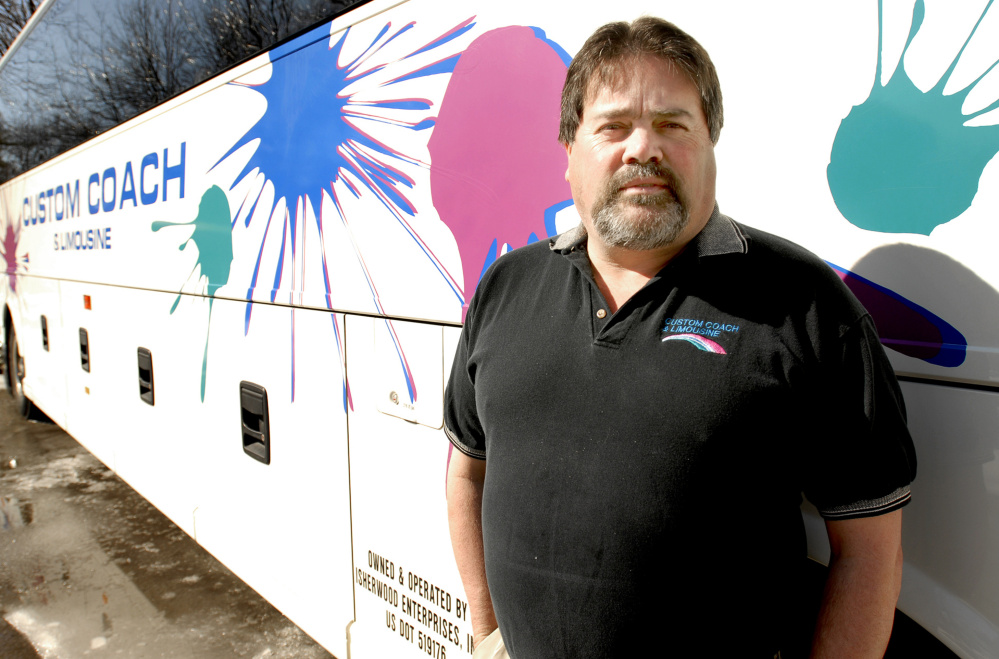A coalition of four Maine bus firms has accused Portland Metro of using taxpayer subsidies to undercut private companies interested in providing a university student shuttle service.
Criticism is focused on a deal between Metro and the University of Southern Maine to provide a transit pass program for students and staff. The arrangement is part of Metro’s $4.5 million Transit West project, a major expansion that includes new bus service between Portland and Gorham. It is planned to launch in 2018.
On Tuesday, opponents of the plan unveiled Taxpayers for Wise Transit Spending, a campaign to pressure USM to cancel its contract with Metro and consider student shuttle bids from private companies.
“We are not against public transit at all, but it needs to be practical,” Gregg Isherwood, owner of Custom Coach and Limousine, said at a news conference Tuesday afternoon. The company’s six-year shuttle contract with USM ends next year. Bus companies were never asked if they could provide service similar to Metro’s, Isherwood said.
“We fail to see how the public is benefiting from this,” he said.
But Dan Demeritt, head of public relations for the University of Maine System, said USM contracted with Metro because it wanted students to use public transit, not a private shuttle. Public transit provides more options to get to work, school and internships and may help curb pollution and parking congestion at USM, the university system says.
“It’s apples and oranges. A point-A-to-point-B shuttle service is so much different than the level of access with Metro,” Demeritt said, referring to the entire public bus network. “People can differ if that was the right strategic decision, but Portland Metro is the only provider for transit services in the region.”
Isherwood was joined by representatives from VIP Tour & Charter Bus Co. of Portland, Cyr Bus Line of Old Town, and Northeast Charter and Tour of Lewiston.
In a written statement, the group claimed the new arrangement will be inefficient and will only benefit Metro by directing more taxpayer money to the agency.
Also, students will be unlikely to use the new service because it will take longer, stop more often and be less comfortable, the companies claim.
Bus companies that pay local and state taxes could provide more efficient transportation less expensively, but they wind up losers in this situation, said Jason Briggs, vice president of business development at VIP Tour & Charter. The university didn’t put out a transportation contract for companies to bid on this year, and bus operators said they didn’t know about the agreement with Metro until the deal was announced five months ago, Briggs said. However, negotiations on the Metro-USM project have been public since at least July 2016.
“This time there is no bid put forth. I think that is a great disservice to the state, the system and the university itself,” Briggs said. “The question is, did they do it correctly, did they do it legally?”
The bus companies said they are not considering legal action or any steps beyond their “public awareness campaign.”
Demeritt, the university system spokesman, said USM followed its sole-source procurement process to the letter. “We take it very seriously. Our obligation is to be transparent and abide by our policies and state law,” he said.
Cyr Bus Line holds a $700,000 annual transportation contract with the University of Maine, and the university system paid Northeast Tour & Charter $23,770 for transportation in 2017, Demeritt noted.
“Those services are not impacted by USM’s partnership with Metro, and the University of Maine System will continue using publicly competitive bids for awarding these important services,” he said.
In a joint statement, Metro and USM said the new transit line offers public transportation opportunities that the private sector cannot. “We should not compare what a private charter company can provide to individual organizations with what a regional transportation system can provide to a growing metropolitan area,” the statement said.
USM will continue to pay private coach companies to transport sports teams and for chartered trips, business worth $266,000 in 2017.
Metro and USM signed an agreement in August to provide a Metro U-pass for 8,000 USM students and USM faculty and staff. A limited bus called the Husky Line will service the Portland and Gorham campuses with stops in the two communities and Westbrook. The transit plan includes a new bus route between Westbrook and the Maine Mall.
The U-pass program will cost USM about $400,000 a year. The current shuttle contract costs $394,000 a year, according to USM.
In August, Metro said federal funding would cover 80 percent of the $4.5 million expansion project startup costs, with local payments covering the remainder. Gorham is expected to pay $35,000, Westbrook up to $330,000 and Portland up to $85,000, according to August projections from Metro.
Peter McGuire can be contacted at 791-6325 or at:
pmcguire@pressherald.com
Twitter: PeteL_McGuire
Send questions/comments to the editors.



